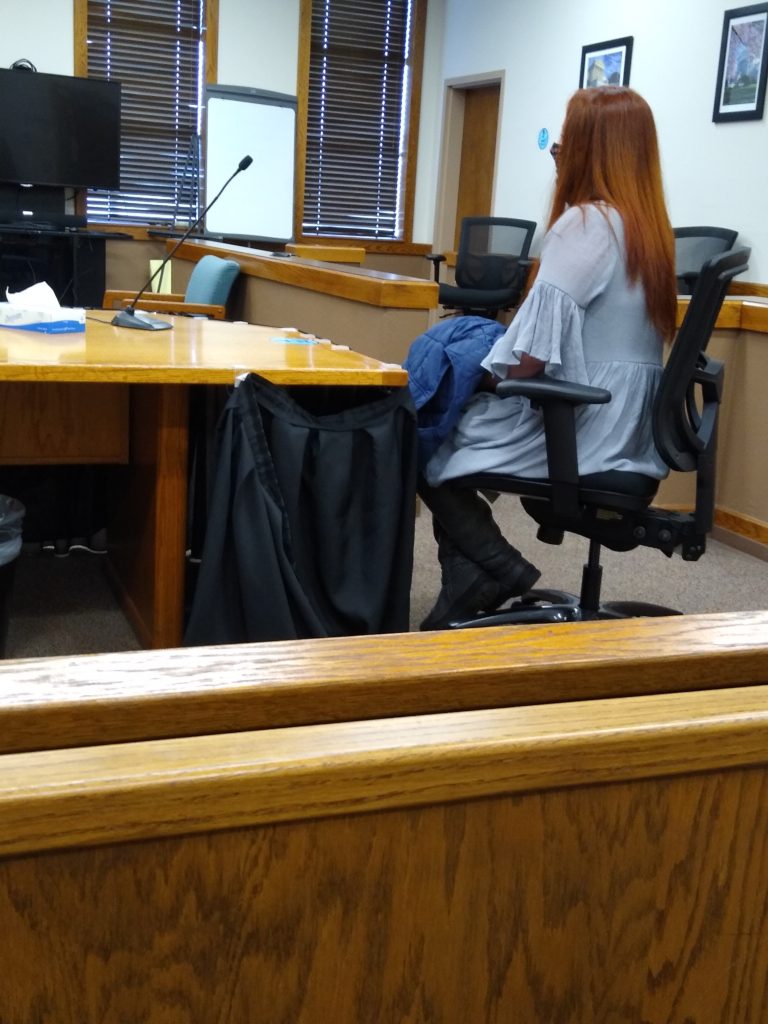
SPECIAL TO YACHATSNEWS.COM
Linda and Joe Tapal don’t look abused. Their faces aren’t bandaged or bruised; they wear no casts. Yet the Yachats couple suffered what may be the most common type of elder abuse — financial exploitation.
Lincoln County Circuit Court Judge Sheryl Bachart last week handed down sentences against Jennifer L. Snyder, 45, of Waldport after her convictions for fraudulent use of a credit card, identity theft and criminal mistreatment in the first degree — all felonies.
“The jury found beyond reasonable doubt that you stole from people who had trusted you,” Bachart said before sentencing Snyder. “This case is absolutely worthy of a jail sentence, but there isn’t room at the jail — I asked,” she said.

Snyder was ordered to serve 20 days on a county work crew, 160 days of community service, fined $500, and barred from any contact with the Tapals. She’s further banned from “working in a position of trust with any elderly or disabled person,” or accepting any job that involves handling money, unless permitted by her probation officer. She was also directed to inform any future employers of her convictions, and to pay a $35 monthly fee for each of the three felonies.
“I think the judge was fair, as much as she could be,” said Linda Tapal, 78, adding that she wished Snyder could have gotten jail time.
Still to be determined is how much, if anything, Snyder will have to pay in restitution to the Tapals for the money spent on travel to and from the Lincoln County Courthouse during the three years the ordeal dragged on. Joe Tapal, 83, is disabled and uses a wheelchair; he needed either transportation assistance to and from the courtroom, or an at-home caregiver while Linda Tapal went to court.

Metallica concert, vacation, clothes
According to court documents and interviews with Linda Tapal and her advocate and friend, Cheri Capron of Waldport, the situation started innocently enough. In 2017, Linda Tapal’s hairdresser referred Tapal to Snyder and her husband, Carlos Murrietta, to help unload a moving van. From there, the relationship progressed to the point where Snyder was providing caregiver and general household services to the Tapals. From driving the couple to medical appointments (Tapal underwent surgery on both eyes) to buying groceries with Tapal’s credit card, Snyder became a trusted helper.
That trust dissolved in September 2017 when, according to court documents, Snyder began using the card to rack up over $1,000 in purchases: “lodging, tickets and or property.”
“She went to a Metallica concert on me,” said Tapal, adding that Snyder also used her card to pay for a vacation rental and buy yoga clothes. “I trusted her, so I wasn’t as careful as I should have been.”
A call from her credit card company alerted Tapal to the fraudulent charges. She called Newport police and began a three-year journey of trying to find justice.
Court delays, changes of attorneys and priorities given to violent crimes postponed Snyder’s trial multiple times. Charges against Murrietta, her husband, were dismissed.
“Every time there was a delay it was heartbreaking; Linda felt like she was re-victimized every single time,” said Capron, who accompanied Tapal, alone or with Joe, to the courthouse in Newport many of those times.
Capron is quick nevertheless to credit the Lincoln County District Attorney staff with doing their best: “They’re drowning in cases and paperwork.”
According to Tapal’s itemized list of restitution expenses, she travelled to Newport 11 times between December 2018 and January of this year. In addition, there were six instances where the trial, hearing or sentencing were cancelled and re-scheduled.
Financial abuse the most common type
Sadly, the Tapals’ experience isn’t an isolated one.
According to the Adult Protective Services division of the Oregon Department of Human Services, among seniors not living in a facility, 32 percent of abuse complaints were for financial exploitation — more than verbal or physical abuse, neglect, abandonment or sexual abuse.
And, as Baby Boomers age, the problem will get worse. Each year, DHS and its various offices receive over 35,000 calls of concern, and investigate more than 16,000 complaints of adult (age 65 and older) abuse and self-neglect. In 2010, 13 percent of Oregon’s population was 65 or older; in 2010, DHS reports that 20 percent will be in that age group.
Those who report suspected abuse are protected: they can remain anonymous or, if a name is given, anyone reporting abuse with “reasonable grounds” is immune from civil and criminal liability.
A private home, of course, isn’t the only location where abuse can occur. The state’s Aging & People with Disabilities office offers an online registry of facilities that can be checked to determine complaints and/or licensing violations.

Financial abuse “vastly underreported”
As disturbing as the numbers may be, “We know elder financial exploitation cases are vastly underreported,” said Lincoln County District Attorney Lanee Danforth. “I do not believe the numbers are an accurate reflection of how widespread this problem is in our community.”

Victims of such crimes may be reluctant to step forward for a variety of reasons, according to Danforth: lack of knowledge of the abuse, embarrassment, or the need to rely on the perpetrator for support.
“This is especially true when the abuser is a caregiver and/or family member,” she said.
The district attorney said elder abuse crimes are usually committed by someone known to the victim, often a family member or caregiver. Especially at risk are elders who live alone, rely on others for care, have cognitive issues, or are isolated from their social network and family.
To safeguard against financial exploitation, Danforth suggested:
- Be on the lookout for unpaid bills that the elder should have the means to pay;
- Watch for spending that seems out of character, such as receipts showing the purchase of dog food when the elder doesn’t have a dog, or even of a car when the elder doesn’t drive.
Other red flags, according to Danforth, include sudden changes in the elder’s will, power of attorney or financial documents; missing checks or credit cards; unexplained transfer of assets, and confusion about transactions and bank statements.
When looking to hire a caregiver, Danforth recommended going through a certified agency, and asking and checking for references. One such agency is the Oregon Home Care Commission, a department within DHS. By calling, or visiting the OHCC website, potential employers can get a list of caregivers who have been background-checked and cleared.
Where to start seeking resources
The State of Oregon has a number of government offices set up to help the elderly and disabled. OHCC executive director Cheryl M. Miller recommended that the search begin with the state’s Aging and Disability Resource Connection.
“The ADRC not only provides options for counseling, but also information about state and community resources,” Miller said.
Today, Linda and Joe Tapal remain in their home, helped by two background-checked people they found through the OHCC.
“People in Yachats are kind of desperate at times; it’s hard to find people to help out,” Linda Tapal acknowledged. She urged anyone looking for help in the home to make sure to hire people who have had background checks conducted — like those on the OHCC registry.
But, after their three-year ordeal, Linda Tapal is relieved.
“It was a matter of principle for me … I would have crawled to get to the courthouse. I feel good about telling people to do the background checks so they don’t have to go through this. Be really careful!”
Elder abuse resources and information
Oregon Home Care Commission Registry website; or call 877-867-0077;
Oregon Aging and Disability Resource Connection website
Office of Adult Abuse Prevention and Investigations website, or call 503-945-9495.
To report abuse: Adult Protective Services, 855-503-7233; or 541-924-8418.



Shout out to Care agencies who screen, background check, and train caregivers. Aging Wisely with Heartfelt Hands is excellent…to work for and to receive care from.